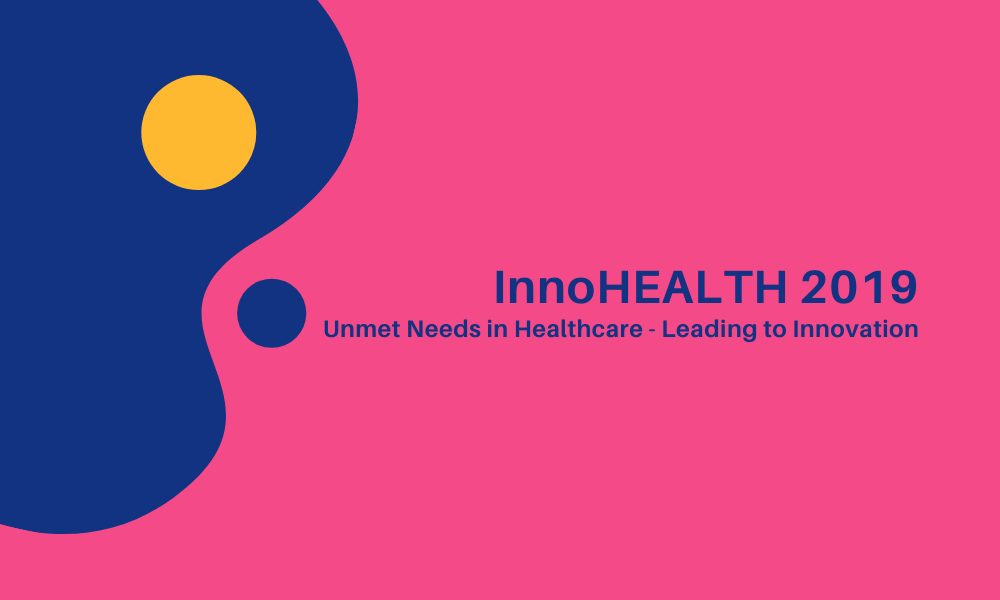While winter started knocking the doors of North India, the vibrant city of New Delhi observing a gradual plunge in its morning temperature was witnessing one of the most remarkable events of the year where eminent thought leaders shared their astounding ideologies on innovations in healthcare.
Read past InnoHEALTH conference press release:
InnoHEALTH 2017
InnoHEALTH 2018
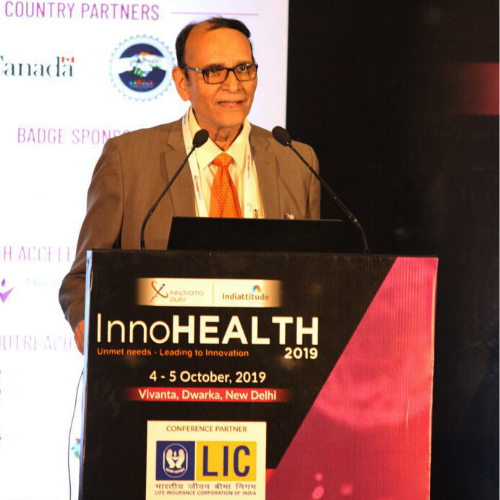
The inaugural session was addressed by Dr. V K Singh, Managing Director, InnovatioCuris Pvt. Ltd., who set the tone for the conference by raising the genuine questions as how one can create healthcare delivery at optimum costs. He emphasized on working with grassroot innovators. In his speech, he also warned the young innovators to trust the technology only up to a limit.
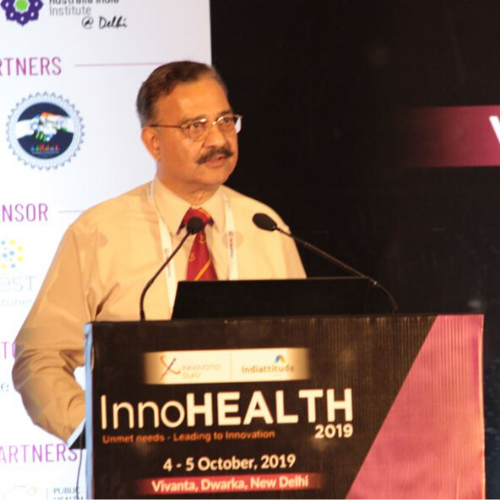
Our guest of honor, Lt General (Dr.) Rajesh Pant, National Cyber Security Coordinator,Prime Minister’s Office, Government of India, in his special address quoted Mark Twain’s quote, “Gutenberg’s invention created heaven, and along with it a new hell”. He related this saying by how it applies equally to technology. As the technology has given us new horizons and ways to live, it has alongside created problems too.
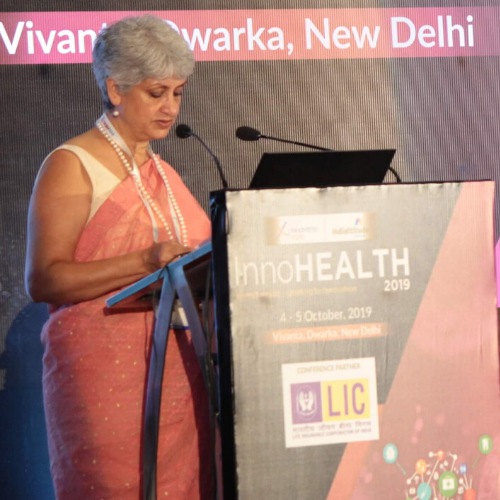
Dr. Yasmin Ali Haque, UNICEF India Representative in her introductory address, gave a brief overview on the how unmet needs, especially in health sector become the mother of innovations and how technology can be a solution to address those innovations. She insisted on the use of scalable technology as to how it can be made accessible to millions of people. Referring to this, she talked about the 2030 agenda for sustainable development. The world has resolved to leave no one behind in fighting extreme poverty and preventable child deaths.
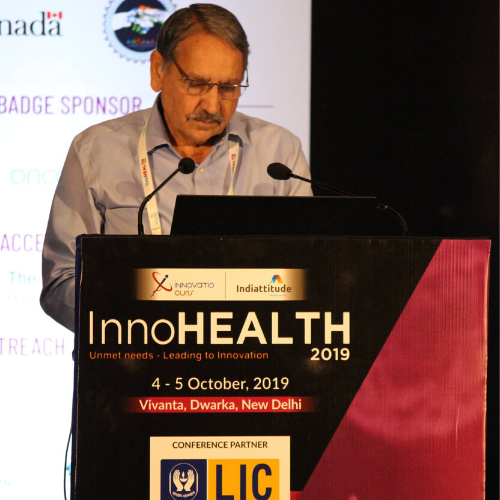
Mr. Karnal Singh, Ex-Enforcement Director, India raised during his speech Narayana Murthy’s concern that there have been no recent innovations from India. “Are we so bad?” He said we would have to think differently for finding solutions. The education which we receive in our country is more competitive than collaborative.There are many unmet needs in health sector, for example, for majority of injections, cold chain is not maintained. It’s been a long time that we could have insulin tablets rather having the existing insulin injections. India, prominently being an agricultural land faces a major unmet need of water requirement, which is only 50% against the 80% requirement. He acknowledged that 2010-2020 has been the decade of innovations for India. To everybody’s pride, the ranking of India in the global innovation index has improved by five places to 52nd in 2019 from 57th position last year.
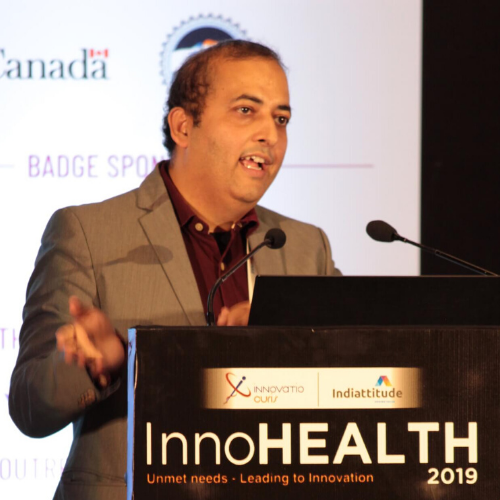
Sachin Gaur, Director Operations, InnovatioCuris, took the opportunity to drive everybody’s attention towards the trust deficit which persists in medical community and equity of stakeholders. He insisted on developing a common language within the medical fraternity to which Artificial Intelligence (AI) can be a probable answer.
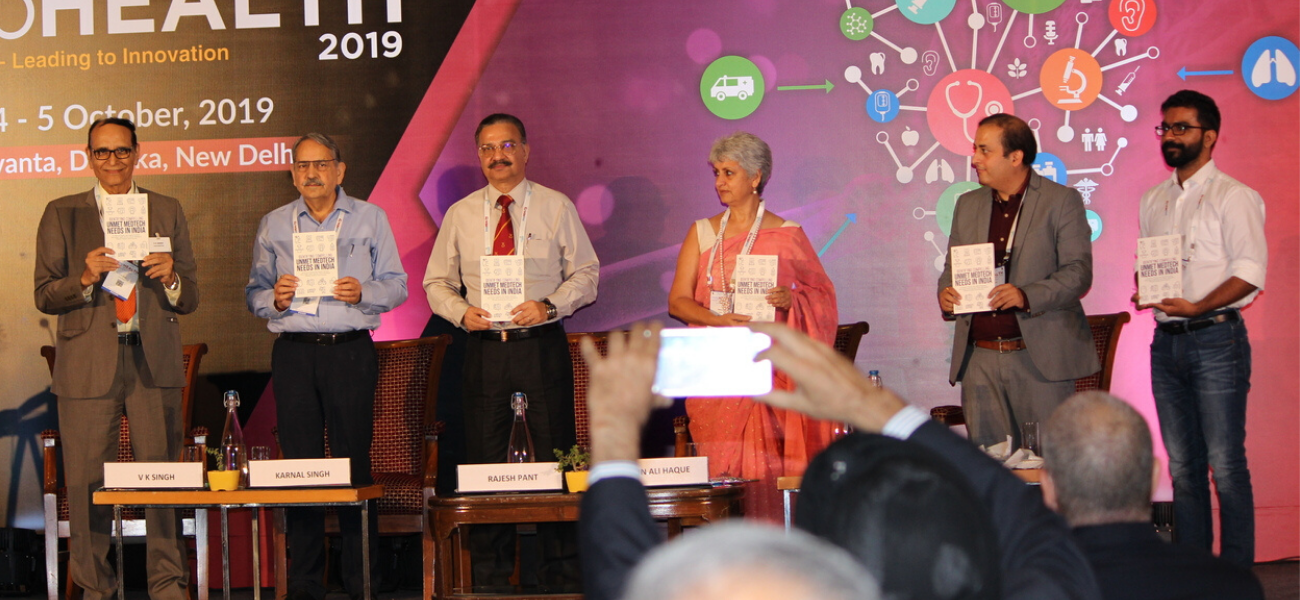
The forum manifested remarkable heterogeneity with its speakers from various realms across the globe. The second session on “Innovations for hospitals and insurance companies” was very interestingly structured as a free-style discussion.

Mr. Mohan Krishnan introduced the discussion with a brief presentation on the global trends in healthcare and their affordability. He particularly emphasized on access to healthcare resources and quantity shortage in India. He highlighted how lifestyle associated diseases have taken over the communicable diseases. He discussed the key trends in supply dynamics, their relationship to healthcare sector, and the challenges and opportunities for their future implementation. The functional and central aspect of this session was majorly about healthcare which is accessible and affordable to the masses. Other key points that emerged during the session are outlined as:
- switching of communicable to non-communicable lifestyle associated diseases
- lack of medical care in rural areas
- Ayushman Bharat Yojana or Pradhan Mantri Jan Arogya Yojana or National Health Protection Scheme: one of the largest and promising healthcare initiatives which aims to address healthcare holistically
- patient feedback must be a pre-requisite while thinking of the innovations which can fulfill the unmet needs
- biggest challenge in healthcare is information symmetry
- one of the most remarkable point that came up was that the healthcare provider should be “paid to prevent”, and not paid to cure
- 5 P’s should be prioritized: People, Plant (equipment in hospitals), Processes, Premises, Patient care
This enlightening session focused on four most important factors, viz., better health outcome, better patient experience, better staff experience and better costs.
The tone of the next session on “Innovations in medical devices and diagnostics” was set by majority of doctors. The diagnostics could be done by the help of paramedics or people other than doctors and then they could be replaced by automated systems or AI. There are schemes such as Ayushman Bharat, which give accessibility to each one. The innovations could be patient centric, healthcare centric or in terms of sustainability. The focus was on trends impacting medical devices and diagnostics, for example, lab-on-chip, wearable health monitoring devices, AI, 3D printing, etc.

The tone of the next session on “Innovations in medical devices and diagnostics” was set by the majority of doctors. The diagnostics could be done by the help of paramedics or people other than doctors and then they could be replaced by automated systems or AI. There are schemes such as Ayushman Bharat, which give accessibility to each one. The innovations could be patient-centric, healthcare centric or in terms of sustainability. The focus was on trends impacting medical devices and diagnostics, for example.
The brainstorming session provided meaningful insights into the remedies which innovations can bring to the unmet needs in healthcare. Prime Minister’s health and wellness program were much talked about. Challenges in the not-much-explored area of management of blood banks were discussed. The lack of a centralized system of blood banking is a major concern.
The role of medical robotics, which is a type of disruptive technology, is very fascinating. The thought of switching from open surgery to key-hole-surgery to no-hole surgery is in fact very intruding. Another major concern across the globe is diabetes and how the diabetologists across the nation are ignorant in not examining the feet of their diabetic patients as 30% of the diabetics suffer from severe foot diseases. There are ample cases of diabetic amputation, which must raise an alarm within the diabetologists.e lab-on-chip, wearable health monitoring devices, AI, 3D printing, etc.
The fourth session was a very inspirational one wherein the dais had seven women innovators, each one unique in their own fields. As Prime Minister Modi once said, “The progress of humanity is incomplete without the empowerment of women.
”InnovateHER gave a common platform to few wonderful women where they shared their stories of inspiration, falls, and experience. This session was indeed a beautiful stretch of one hour where these women from varied backgrounds and aspirations showcased their expertise and their words gave hope, path and motivation to everybody present in the auditorium. They were an epitome of women empowerment and proved it greatly “Komal Hai Kamzor Nahi Tu, Shakti Ka Naam Hi Naari Hai, Jag Ko Jeevan Dene Wali, Maut Bhi Tujhse Haari Hai”.

Ms. Shriya Sethi, presented detailed statistical data on women entrepreneurs, about emerging trends in healthcare innovations, the existing lacunae and the current scenario of general well-being of people.
Ms. Priya Prakash, Founder & CEO, HealthSetGo, was one of the youngest innovators, who herself realized at a very tender age, the importance of good health. This drove her to initiate her existing foundation, which focuses on the wellness of children. “If the kids are healthy in the first place, the coming young generation would be disease-free”, was her take on the evolution of her organization.
Another eminent panelist Ms. Preeti Rao, Founder & CEO, Weljii, inspired everybody around to focus on being healthy. Instead of talking about the illness, she emphasized more on how people must take care of their wellness which includes both physical and mental health.
Ms. Veena Sehgal, a pharmacist and entrepreneur mentioned the gap in the availability of medicines which the doctor prescribes. They are most of the times available on area-specific basis which makes it difficult and time consuming for the patients. There should be an emphasis on generic medicines, rather than brands.
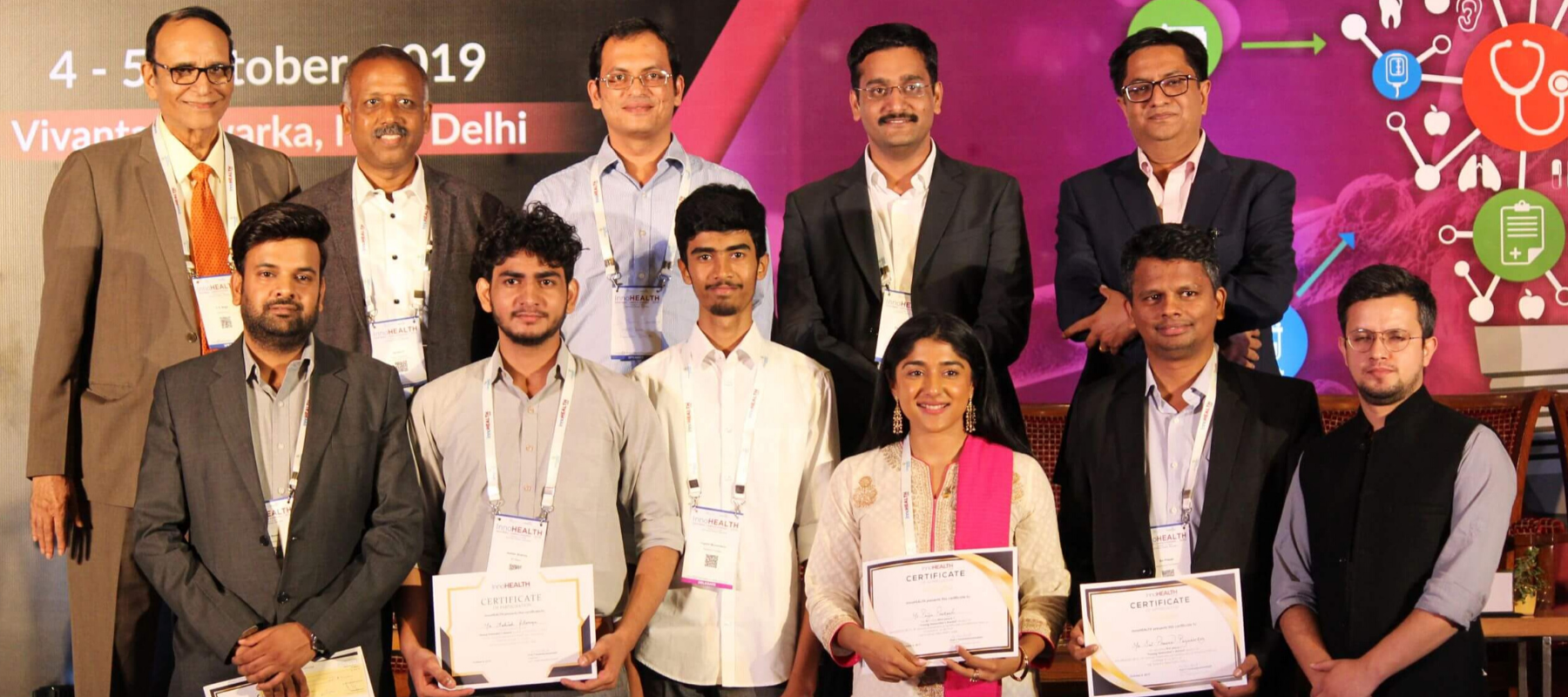
Amidst such tech gathering which had brought together so many thought leaders and experts alike; we had between us few young innovators. These innovators with their priceless ideas and vision delivered their pitches to make their candidature remarkable in its unique way.
The candidates included Priya Prakash (HealthSetGo), Yogesh M (Hybrid effluent water system technology), Saiprasad Poyarekar (spray-on skin tissue), Ashish Sharma (Drip monitoring system) and Vijay Kumar Kumawat (Microporous implants). With their unique set of products/services, the candidates made it difficult for the jury to decide on the winners. Saiprasad with his technological advancement of spray-on skin tissues to get rid of minor-to-severe burns grabbed him the award for best innovator pitch. He was followed by Vijay Kumar, as 1st runner-up and Priya Prakash as 2nd runner-up.
The next session was a special one dedicated to diabetes, one of the most worrisome chronic diseases across the globe. The speakers talked about how to monitor, control and manage the disease.

Dr. Arjun Dang, CEO, Dr. Dangs Lab, who was chairing the session referred India as the “diabetic capital of the world”, referring to the alarming scenario of the affected Indians wherein around 16 million Indians are affected with Type 2 diabetes, and this number is expected to rise to more than 100 million in the next ten years. He also insisted not to commoditize healthcare, rather consider it as a service which requires a lot of compassion and empathy.
One very relevant question that came up was that “Why Indians are most prone to diabetes?”. Probably it is because of the harmful oils and highly processed foods available in the Indian markets. Stress is a huge component in diabetes management. Exercise and breath-management (pranayama, etc.) have a major impact on diabetes management. One of the major contributors of diabetes is non-nutritional food. Sleep which is often understated has a direct impact on blood sugar level which increases due to lack of proper sleep. Diabetic patients can improve only to fall back again into the same pit and destroy their health, hence it is of utmost importance to rescue them.
Among the highlights of the next session, “India Global Collaboration in Health Sector: Start-up Opportunities and Challenges” were the long-term Australia-India collaboration goals in the field of Science and Technology. To seek the answer to the question, “What can India offer to countries in the panel and what do the countries have to offer for India?”, let’s read next.

Dr. Jukka Holappa, Commercial Counselor, Country Manager India at Business Finland, shared the current status of healthcare in Finland. He spoke about the excellent condition of R&D in Finland, among which ten large companies are Indian.
Dr. Shiban Ganju, shared that he has come to India because India is “where all the action is happening right now”. He talked about traditional medicines in India, differential pricing of products across various countries. The innovators must focus on “frugal innovation”, for providing the best of healthcare.
Ms. Sharda Balaji, a lawyer by profession highlighted the importance of mobile penetration which is the largest in the world in India. There have been tectonic shifts happening in technology. She discussed how India is all about affordability and value consciousness. The concept of “jugaad” or making things doable work well in India. This is where a lawyer is needed to license the product(s). The major challenge she mentioned in India is lack of connectivity with deep science and research across geographical locations within the country due to its enormous size.
Much was talked on the existence and emergence of the digital health in the intriguing session on “Digital Health: Giving Birth to New Delivery Models through Mobile, IoT, Blockchain and Artificial Intelligence”.
Mr. Jacky Ovadia, General Manager, IDEA (International Innovation & Business Development expert), Israel shared with the audience his viewpoint on advancement in telemedicine. There must be portable medicine devices which can effectively check pulse and nerves very easily. He mentioned about remote monitoring for ultrasound, pregnancy, pulse checking, and clinically approved digital urinalysis. He said that a concept which uses GPS to monitor patients’ activities and habits can have varied impact on people’s lives.

Way forward
With such inspirational, informative and interactive sessions, the two-day conference came to an end, raising too many new questions and challenges that may impact healthcare, especially in India. It also gave answers to many existing issues through the numerous innovations that were presented. The generic thought which probably each one had was on the affordability and accessibility of good healthcare. If the innovations are not scalable, easily accessible and cost-effective to the masses, they cannot persist for long.
Of utmost importance were the views on how AI can save lives, and the importance of end-to-end affordable healthcare. IoT can connect to anyone, anytime, anywhere in rural and urban areas where reach is low, and how AI helps in diagnosis and innovation. Early intervention can resolve health problems and there is a huge scope in the use of the apps which can enable timely and real time intervention. With highly potential schemes like Ayushman Bharat, we can create value chain in affordable and accessible healthcare for everyone.
The healthcare sector sees immense opportunities with the innovations happening across the globe. Innovation pitches from global and Indian companies that were conducted wherein organizations from various sectors came forward to present their portfolio of services and products.
Innovators and researchers are working on various aspects wherein they can target various chronic as well as lifestyle associated diseases. For example, the Nano 4 TB kit helps detect TB easily. There are various state-of-art laboratories across the nation which are deployed and use high-end technology, for example next generation sequencing is used to perform operations to detect aneuploidy or any kind of anomaly which is responsible for spontaneous miscarriages and mental retardation in live born babies. In the light of technology, innovation and healthcare, we must look at technology with a business view; how technologies work in society, sustainability of the model with traditional delivery, and about new models in healthcare.
Read past InnoHEALTH conference press release:
InnoHEALTH 2017
InnoHEALTH 2018
Also Read: Press Release: The International Medical Travel Show Dubai 2020
About the author
Dr. Jasmeet Chhabra is a Doctorate in Immunology and whenever she gets free time from the full-time job she loves to read and write about imperative issues in healthcare.

